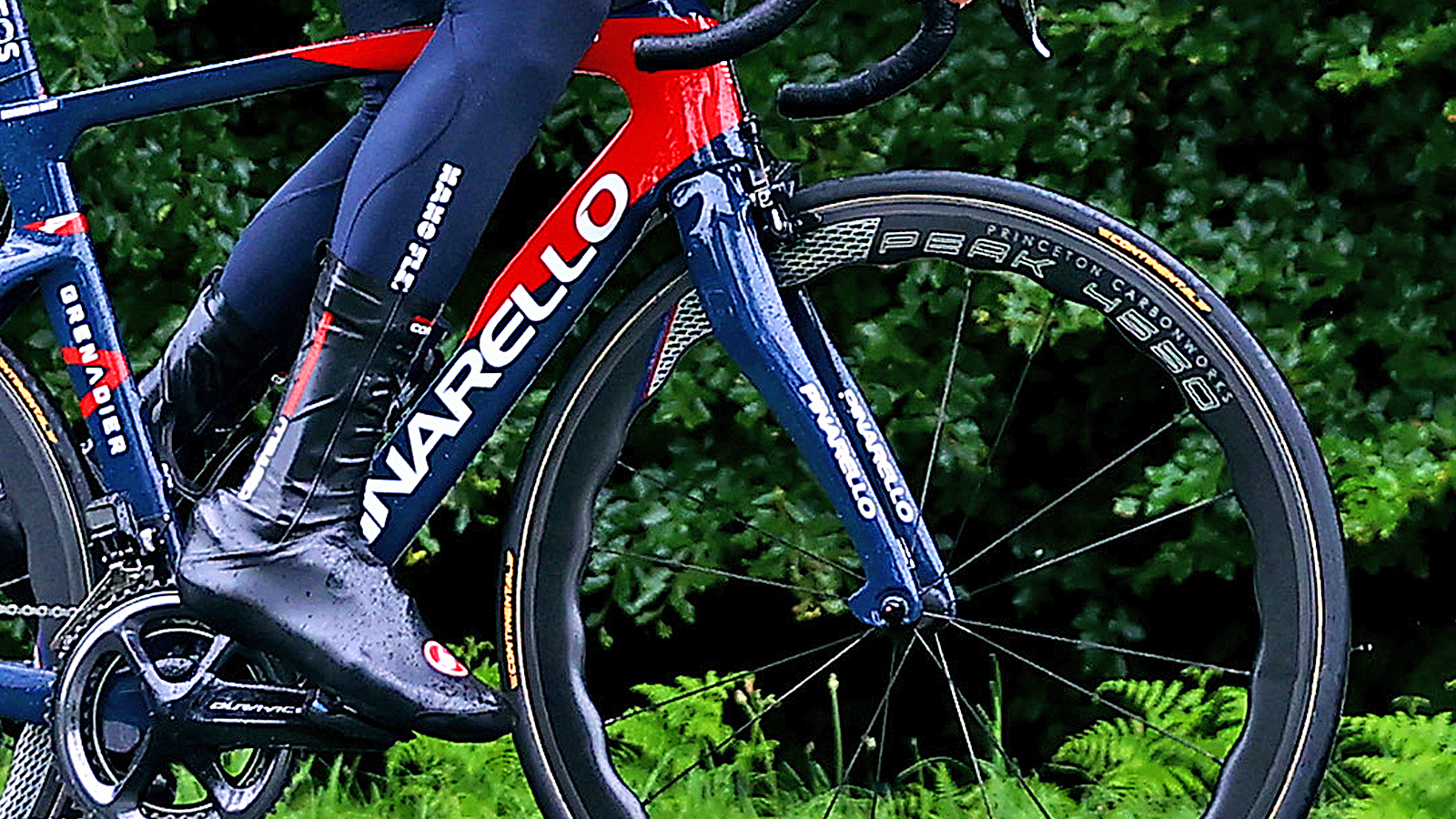Ineos Grenadiers switch to sponsor-incorrect Princeton Carbonworks wheels at Tour de France
With the new lighter Pinarello Dogma F, team swap from Lightweight Meilensteins to new hoops

It appears Ineos Grenadiers have chosen to shun their sponsor correctness obligations once again, as, with just a day to go until the Tour de France begins, riders from the team have been spotted using the new Peak 4550 wheels from Princeton Carbonworks.
The team have done very little to hide the brand and model of wheel they're using, with the Launch Edition wheels getting a particularly loud graphic and the 'Peak 4550' wordmark emblazoned across the sidewall of the rim.
Even without this, they would be instantly recognisable thanks to their sinusoidal (wavy) rim profile.
The team have a strong history of buying their own wheels in favour of using those supplied by Shimano. It started in 2019, when they used Lightweight Meilenstein Obermayer wheels during that year's Tour de France, and has been an ongoing theme since.
Their first connection to Princeton Carbonworks came when Dylan van Baarle was spotted using the Wake 6560 front wheel during the time trial at the World Championships in Yorkshire in 2019, and the team have continued to fly in the face of sponsor correctness since. Princeton Carbonworks' wheels have been a common sight in time trials, while Lightweight's Meilensteins have been a prerequisite when the road points up.
Utilising technology to maximise performance is nothing new, and the British team coined the term 'marginal gains' long ago, so unsurprisingly, meeting the 6.8kg weight limit has always been an important factor for the team on mountainous terrain. As a result, the inability of the Pinarello Dogma F12 Disk to meet the UCI's lower limit of 6.8kg has long been cited as the main reason that Ineos Grenadiers remain the only team steadfastly committed to rim brake technology, and it's the very reason the team switched to the 935g wheels from Lightweight.
But, with the launch of the new Pinarello Dogma F this week, which is said to be 265g lighter than the previous Dogma F12, the team have clearly been given some breathing room.
Get The Leadout Newsletter
The latest race content, interviews, features, reviews and expert buying guides, direct to your inbox!
Weighing in at 1,071g per set in their lightest tubular and rim brake guise, the Princeton Carbonworks Wake 4550 wheels are still incredibly light, but come in at 136g over the Meilenstein Obermayers. This will no doubt help the team bring the bikes back up to the 6.8kg weight limit, but it's unlikely to be the only reason for the decision.
Firstly, the design of those Lightweight wheels is many years old and still utilises the V-shape profile, rather than the more commonly today-found blunt U-shape leading edge. The more rounded design has time and time again been proven to be faster aerodynamically, and it's telling that the entire industry has moved in that direction.
No wind tunnel data has tested the two wheels side by side, but the flat land performance of the Princeton Carbonworks wheels will almost certainly be better, allowing riders to save valuable kilojoules ahead of the more race-deciding hilly terrain.
More interesting, however, is the team's commitment to the sinusoidal design offered by Princeton Carbonworks, which isn't dissimilar to the sawtooth design used by Zipp's NSW wheels. Handily, our esteemed reviewer Guy Kesteven recently put together a detailed explainer of how this works in his recent Zipp 454 NSW review, but the result of the undulations is said to offer a marked increase in crosswind stability.

Josh is Associate Editor of Cyclingnews – leading our content on the best bikes, kit and the latest breaking tech stories from the pro peloton. He has been with us since the summer of 2019 and throughout that time he's covered everything from buyer's guides and deals to the latest tech news and reviews.
On the bike, Josh has been riding and racing for over 15 years. He started out racing cross country in his teens back when 26-inch wheels and triple chainsets were still mainstream, but he found favour in road racing in his early 20s, racing at a local and national level for Somerset-based Team Tor 2000. These days he rides indoors for convenience and fitness, and outdoors for fun on road, gravel, 'cross and cross-country bikes, the latter usually with his two dogs in tow.